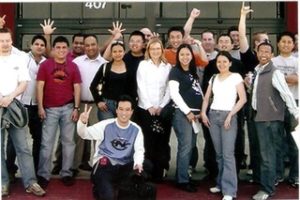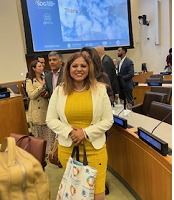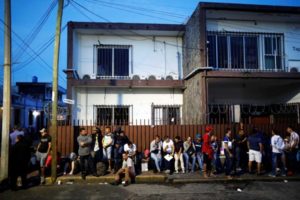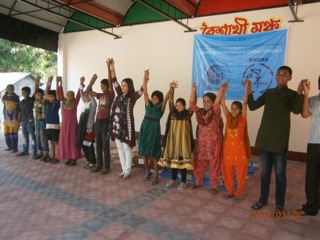The UN has told Myanmar’s military junta that “the right of peaceful assembly must fully be respected”.
In a phone call, UN Special Envoy Christine Schraner Burgener warned that “any form of heavy-handed response is likely to have severe consequences”.
Access to the internet in Myanmar was restored on Tuesday morning after it had been cut off for a second night.
The junta has been regularly blocking the web to try to stifle dissent since the 1 February coup.
Schraner Burgener’s warning came during Monday’s phone call with the junta’s deputy head Soe Win, a UN spokesperson said.
The special envoy stressed that internet blackouts “undermine core democratic principles”.
Protesters were out again early on Tuesday, with news agency Reuters reporting small groups gathering.
They have been encouraging civil servants to join the civil disobedience movement in the main city of Yangon.
Earlier, the military authorities announced stiff penalties for those opposing the coup leaders.
The junta says it overthrew elected leaders, including longtime democracy campaigner, Aung San Suu Kyi, due to alleged voter fraud. It has not provided any evidence to support these claims.
Why are they shutting down the internet?
The latest overnight shutdown follows a pattern aimed at disrupting continuing opposition to the coup and the detention of leaders, including Ms Suu Kyi, whose party won a resounding victory last November.
Access to Facebook, a rallying point for a campaign of civil disobedience, was restricted soon after the coup. Use of Twitter and Instagram was also disrupted.
But activists also fear the blackout may be used to arrest more people.
Major telecoms provider Telenor has said it will no longer be updating a list on its website of internet disruption. It told AFP news agency that the situation was “confused and unclear” and said that employee safety was a “top priority”.
What is happening on the streets?
The military’s presence is growing. At many strategic locations, soldiers have replaced the police.
In Yangon, eight-wheeled armoured vehicles have been seen trying to navigate the rush-hour traffic, sometimes surrounded by cars honking in opposition to the coup.
On Monday, protests focused on the central bank building, the US and Chinese embassies, and the city headquarters of Ms Su Kyi’s National League for Democracy (NLD).
And as demonstrators gathered in the central city of Mandalay, there were reports of security forces firing rubber bullets to disperse crowds.
In footage posted on social media, the sound of what appears to be gunshots can be heard as crowds flee, with several people later appearing to display injuries.
A leading student activist who has gone into hiding, Myo Ko Ko, told the BBC why he and others were willing to risk their lives.
“We strongly believe in democracy and human rights. We know that it’s risky,” he said.
“I have to move to another place day by day because of being searched (for) by police. We hope the international community will help us.”
Students also protested in the capital, Nay Pyi Taw. Dozens were arrested and later released.
Residents in several cities are reported to have formed night-watch groups to deter mobs rumoured to have been dispatched by the military to cause unrest.
What are the new punishments protesters face?
The demonstrators are demanding the release from detention of their elected leaders, including Ms Suu Kyi, and the restoration of democracy in Myanmar, also known as Burma.
But the junta has threatened long prison sentences and fines for anyone found to incite hatred towards the military, “by words, either spoken or written, or by signs, or by visible representation”.
In a statement posted on a military website on Monday, it said people preventing the security forces from carrying out their duties could face 20 years in prison, while those found to stir up fear or unrest in public could be imprisoned for terms of three to seven years.
The military government on Saturday gave itself the power to make arrests, carry out searches and hold people for more than 24 hours without a court ruling.
It has also told journalists not to describe the military’s takeover as a coup.
Source: BBC






















